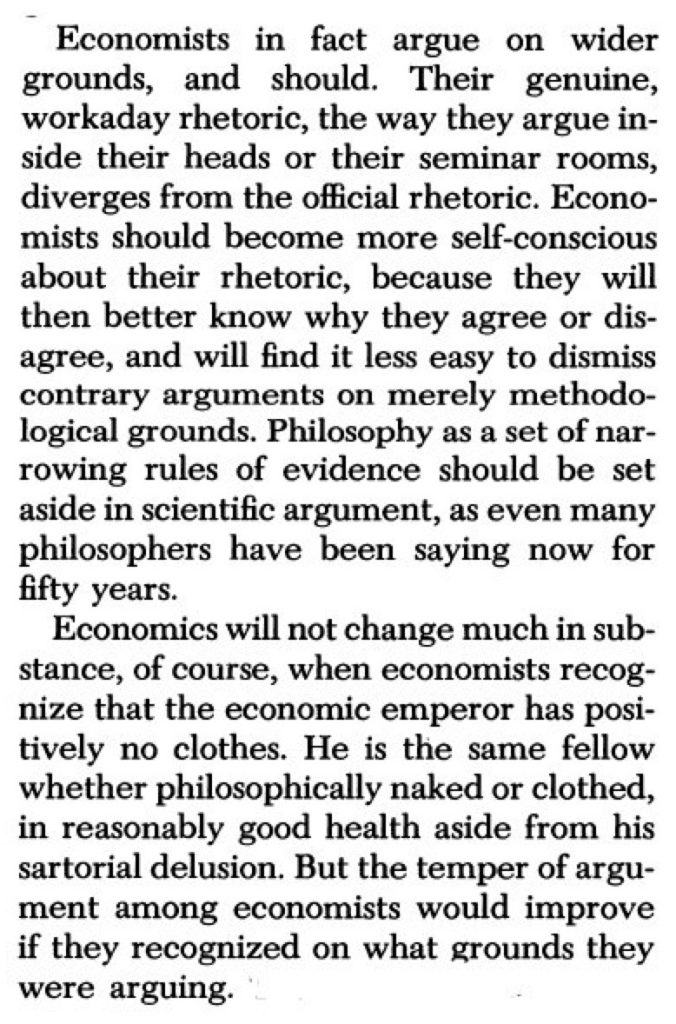There has been a big response to a column I wrote for the FT about the male domination of economics, following up Justin Wolfers’ recent one. My conclusion was:
The reputation of economics is already tarnished, even a decade on from the financial crisis, and this new evidence of entrenched discrimination will not improve matters. This is not a women problem, it is an economics problem. It is deeply embedded in the discipline’s culture and norms, and the profession’s senior men need to take it seriously.
Some senior men emailed to ask for suggestions. Here are some.
These come from a Twitter thread compiled by Jan Zilinsky (@janzilinsky):
1/ Some thoughts on gender biases in academia, following up on @JustinWolfers’ article / Alice Wu’s findings on sexist expressions on EJMR
2/ Causal evidence shows that even when full info about candidates’ past performance is provided bias against female candidates persists
3/ The experiment (How stereotypes impair women’s careers in science) is by @ErnestoReuben Paolo Sapienza @zingales pnas.org/content/111/12…
4/ Plenty of issues to dissect (low representation, disrespect online & offline…)
For the thread I want to focus on *unequal treatment*
5/ One thing that bothers me a lot is the co-authorship penalty. Heather Sarsons @saskatchewin shows men who coauthor more are not penalized
6/ but women are less likely to receive tenure if they coauthor more papers: scholar.harvard.edu/files/sarsons/…
7/ That paper is about outcomes in economics. On evidence that women benefit less from co-authorship in polisci see cambridge.org/core/journals/…
8/ The leaky educational pipelines signal more problems… brookings.edu/blog/brown-cen… and @DianeCoyle1859’s ft.com/content/6b3cc8…
9/ And when the path leads to professorship, imagine you are discouraged with comments such as ↡ washingtonpost.com/amphtml/news/w…
10/ Want to end the thread w/ some “what can be done” links. But many steps are tiny, as @cheng_christine said…:
11/ Let me try anyway. First, we can learn pay attention to other disciplines; see this @BetseyStevenson talk youtube.com/watch?v=vsvPg_…
12/ Second, at a minimum, as @Noahpinion wrote workplaces must be professional (why does it need to be said?!)
13/ Third, evaluation nudges could help. Not anonymizing papers/CVs, but moving toward more joint rather than separate assessments…
14/ Promising research shows people rely less on group stereotypes when making joint (not case-by-case) evaluations decisionlab.harvard.edu/_content/resea…
15/ Tools like the gender bias calculator seem fine, as long as there are users motivated to write fair letters…
16/ And it’d be great to eliminate some behaviors that range from baffling to outrageous. Copious examples were shared in the last 1.5 weeks
17/ Things like first-naming female faculty members; title-forgetting; off-color remarks about parenthood; etc…
18/ We could try valuing things other than prestige, as @cjwich pointed out: “As a field, we fetishize hierarchy. ‘Top 5 journals,’ ‘top 10 programs,’ who is/isn’t in the “club” 19/”
19/ Sometimes I lash out at the fashion police b/c the (gendered) focus on some economists’ wardrobe is ridiculous.
A number of people have suggested ending the anonymity of referees’ reports as this conceals biases – there is deep scepticism about the fairness of the process, which is seen as perpetuating privileged networks, mainly male.
Along with many of the female economists who have emailed me, I have observed a range of patronising behaviours – calling women by their first name, men not, is a common one as Jan notes. Offering ‘advice’ to lower one’s ambitions, in research, or submissions and so on. Asking women dispropotionately to do admin tasks, meetings, ‘service’ in the department.
I’d add:
- senior men are the only people who can address the aggressive culture of economics seminars, which is unique as far as I know. Stop male colleagues from interrupting presenters frequently, rather than giving them space to present. Call people out on hostile, disparaging comments.
- the ‘publish or perish’ culture for young academics makes it impossible for the primary carer of young children to achieve the expected publication targets; this is usually the woman even in apparently egalitarian couples. As Justin Wolfers has noted, the way policies operate may help men even more. The extension periods for new mothers are laughable, as everyone who has had children really ought to know.
- I hope male economists would reflect on the recent discussion, acknowledge that the discipline has a problem, and think really carefully about their judgements about people. When you say ‘X is not very good’ and X is female, are you holding her to a different standard than you would a male colleague? The answer is almost certainly yes.
- I agree about the comment in Jan’s thread about the hierarchy obsession. It is bananas to have only a Top 5 matter….
I hope these provide food for thought. I’ll be happy to update this post with other suggestions.

